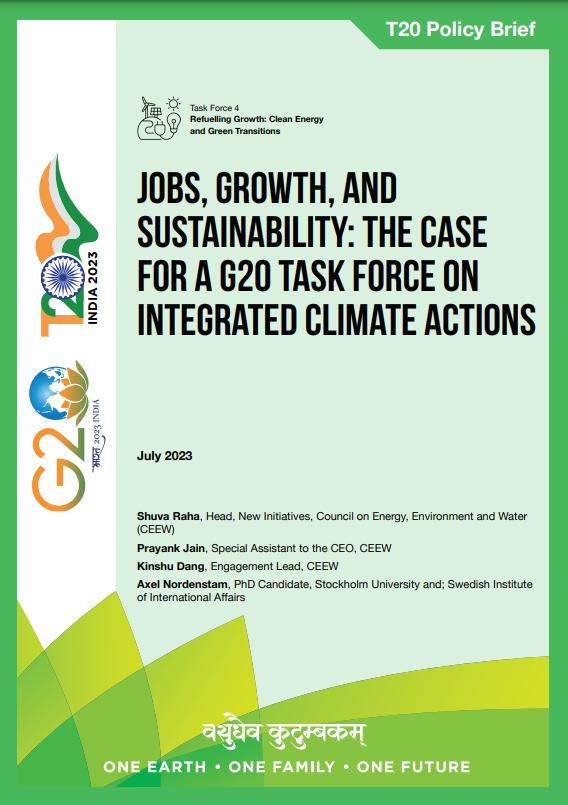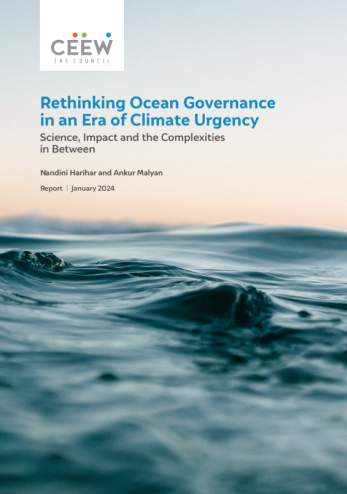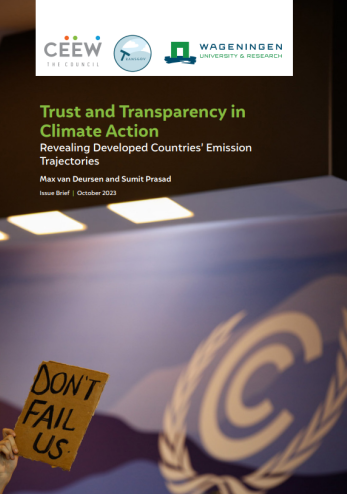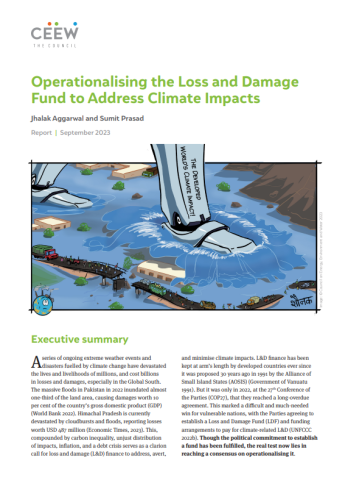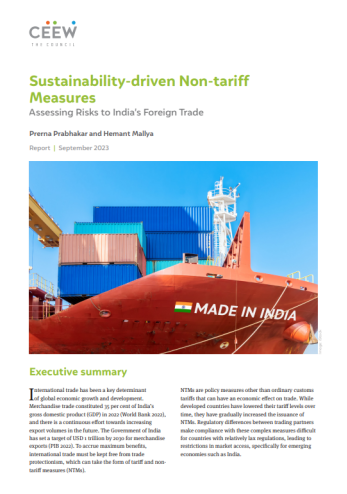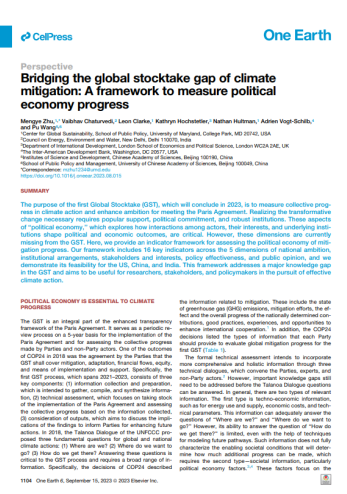Policy Brief
Jobs, Growth, and Sustainability
The Case for a G20 Task Force on Integrated Climate Actions
Shuva Raha, Prayank Jain, Kinshu Dang, and Axel Nordenstam
July 2023 | International Cooperation
Suggested citation: Raha, Shuva, Prayank Jain, Kinshu Dang, Axel Nordenstam. 2023. Jobs, Growth, and Sustainability: The Case for a G20 Task Force on Integrated Climate Actions. T20 Policy Brief.
Overview
This Policy Brief recommends a G20 Task Force on Integrated Climate Actions to map and chronicle the research, decisions and resources of presidencies and Working Groups into a cohesive set to unify, streamline and amplify the impacts of the G20’s economic-development-climate agenda to accelerate the delivery of jobs, growth and sustainability.
The G20's agenda — maintaining international economic and financial stability — has expanded to include multilateral action on global challenges like ensuring sustainable development and mitigating climate change. It has established several initiatives across the Finance and Sherpa Tracks, including Working Groups on Sustainable Finance (SFWG); Development (DWG); Energy Transition (ETWG); and Environment and Climate Sustainability (ECSWG).However, the G20’s structure limits coordination between presidencies, tracks and Working Groups. It lacks a permanent, central Secretariat and archival system; the tracks and Working Groups address issues in silos, and priorities shift annually based on the presidency.
Key Highlights
- Founded in 1999 to increase cooperation on international economic policy and financial stability, the G20 has since expanded its repertoire to include non-fiscal issues like sustainable development, public health, corruption and the digital economy. Its expanding repertoire and the absence of a permanent secretariat have begun to hinder it from consistently and coherently tracking issues between, and even within, presidencies.
- The narrow priorities of presidency countries, or factions of countries, when introduced into the collective agenda, are resisted by other members, creating decision logjams and contested communiqués. Also, the annual presidency format requires each G20 country to only temporarily allocate people, time and financial resources to the G20 process, leading to limited working capacities to address complex challenges as a group in timebound, outcome-oriented ways.
- Interconnected issues such as sustainable development, energy transition, & climate action in the recent presidencies have been discussed in working groups on sustainable finance, development and environment and climate sustainability, energy transition, and disaster risk reduction. It is important to look at each issue with a G20 lens, rather than discrete working group lenses, to avoid knowledge- and decision siloes and contradictions, and help officials holistically understand, evaluate, and contribute their expertise to solve intersecting challenges.
- The G20 needs systematic, transparent and continuous coordination, tracking and referencing of its vast and expanding set of legacy and emerging decisions, platforms, and actions to ensure that (1) issues are addressed in the context of sovereign priorities, national circumstances, ongoing global discussions, and other multilaterals administering similar matters, and that (2) resources like funds, research capabilities, knowledge bases, human capital, and external expertise, are pooled efficiently as and when needed.
Recommendations
- Establish a G20 Task Force on Integrated Climate Actions as a bridge between working groups working on energy-development-climate-linked issues (for example, the SWFG, DWG, ECSWG, ETWG and DRRWG) across presidencies.
- Develop a systematic, centralised and permanent mapping, reporting and archival process through the task force to record these working groups’ research, discussions, decisions, resources, actions and impacts, within the groups and also with external actors, into a cohesive set.
- Evolve the task force to also collate inputs from and to designated international organisations, the G20’s Engagement Groups, and external experts and guest countries. It could also undertake training sessions to build the G20 country representatives’ capacity to understand, evaluate, share and learn from the expertise, experiences, best practices, and nuances of the various members for better cooperation on these sensitive issues.
- Create a unified hub of research, knowledge and impacts, minimise duplication of issues and contradictions in positions, and improve overall coordination within the G20 through the task force. Its memos and reports, supported by the online knowledge platform, will enable real-time access to curated and contextualised content, enhance transparency, and lead to decision and action coherence between Working Groups and presidencies while allowing the G20 to retain the flexibility and versatility of its shifting secretariat.
"It is important to look at each issue with a G20 lens, rather than discrete working group lenses, to avoid knowledge- and decision siloes and contradictions, and help officials holistically understand, evaluate, and contribute their expertise to solve intersecting challenges."




